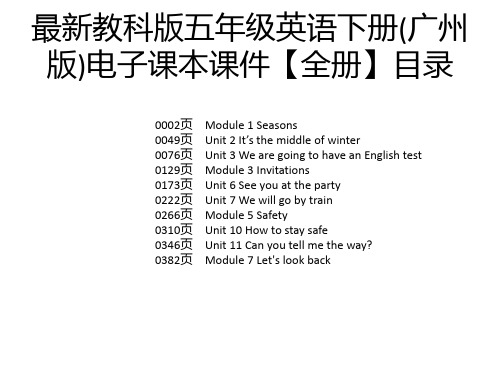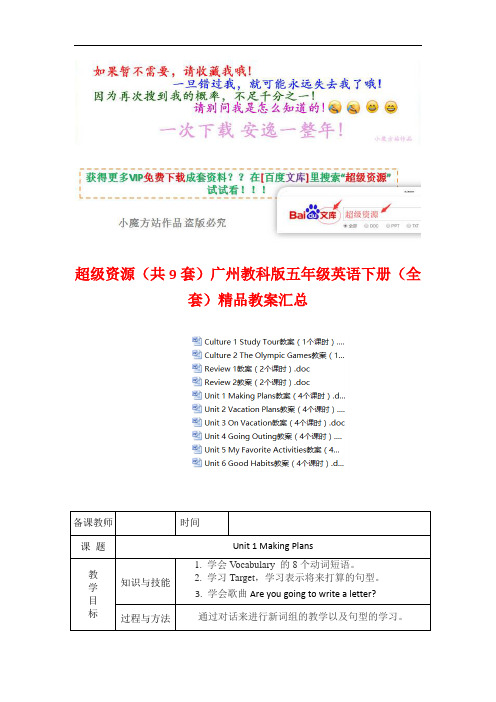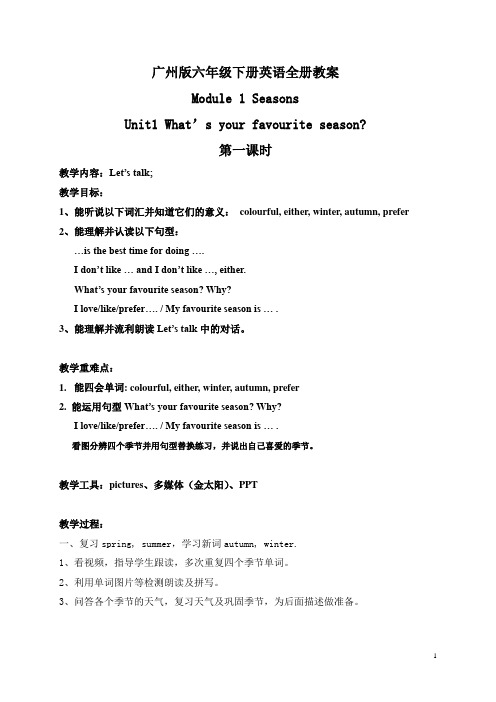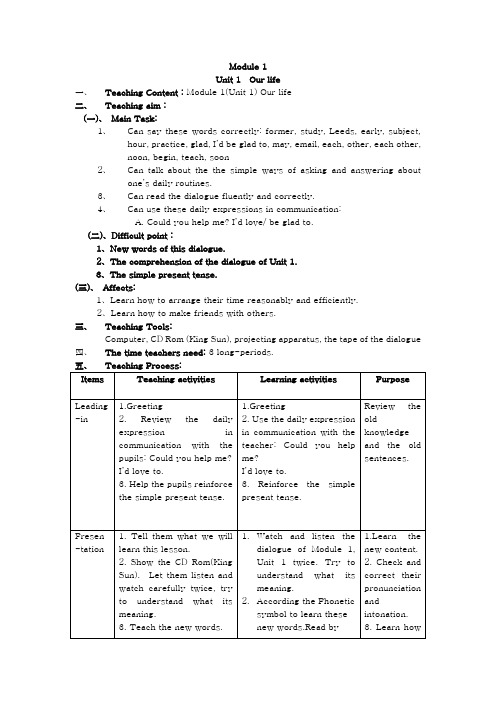2021最新教科版五年级英语下册(广州版)全册课件【完整版】
最新教科版五年级英语下册(广州版)电子课本课件【全册】

Module 1 Seasons
最新教科版五年级英语下册(广州 版)电子课本课件【全册】
Unit 1 What’s your favourite season?
最新教科版五年级英语下册(广州 版)电子课本课件【全册】
பைடு நூலகம்
Unit 2 It’s the middle of winter
最新教科版五年级英语下册(广州 版)电子课本课件【全册】目录
0002页 0049页 0076页 0129页 0173页 0222页 0266页 0310页 0346页 0382页
Module 1 Seasons Unit 2 It’s the middle of winter Unit 3 We are going to have an English test Module 3 Invitations Unit 6 See you at the party Unit 7 We will go by train Module 5 Safety Unit 10 How to stay safe Unit 11 Can you tell me the way? Module 7 Let's look back
最新教科版五年级英语下册(广州 版)电子课本课件【全册】
Module 2 Plans
最新教科版五年级英语下册(广州 版)电子课本课件【全册】
五级英语下册 Module 1 Unit 3(1)课件 广州(通用)

进行时态 be (am , is , are ) doing .
当主语是第三人称单数时, 一般现在时的动词的变化的规律: 1) 一般情况加-s,例如:
visit – visits tell – tells work – works wave – waves 2) 以s, x, sh, ch结尾的动词, 加-es,例如:
either , 用于否定句 。 如: He doesn’t like running . I don’t like
running
either .
情态动词should、could、may的用法及一些交际用语:
1) He should get up early. 2) She shouldn’t play computer games too much.
广州版五年级英语下册 Module 1
结合音标的教学掌握下面读音规则,: e e these Chinese Japanese e he be me we she e-mail ee see need weekday ea easy seal team read speak leave i will hill live visit still winter y only story slowly usually factory Germany p put paper patient policeman stamp sleep b about baby beef bottle black broccoli t turn tape team tomato water letter d dear dollar doctor under hand head
教科版五年级下册 32 我们面临的环境问题 课件(26张PPT)

1984 :沙漠化
2014 :提高你的呼声,而不是海平面
1985 :青年、人口、环境
2015 :促进可持续的生活方式
1986 :环境与和平
2016 :改善环境质量 推动绿色发展
1987 :环境与居住
2017 :人人参与,创建绿色家园
1988 :保护环境、持续发展、公众参与
2018 :塑战速决
1989 :警惕全球变暖
1974 :只有一个地球
2004 :海洋存亡 匹夫有责
1975 :人类居住
2005 :营造绿色城市,呵护地球家园
1976 :水:生命的重要源泉
2006 :沙漠和荒漠化
1977 :关注臭氧层破坏,水土流失
2007 :冰川消融,是个热点话题吗?
1978 :没有破坏的发展
2008 :促进低碳经济
1979 :为了儿童和未来
列举我们面临的环境问题(1)
雾霾
垃圾污染
沙尘暴
光污染
列举我们面临的环境问题(2)
酸雨
水体污染
土地荒漠化
气候变暖
当今全球十大环境问题
1.气候变暖 2.臭氧层破坏 3.生物多样性减少 4.酸雨蔓延 5.森林锐减
6.土地荒漠化 7.大气污染 8.水体污染 9.海洋污染 10.固体废弃物污染
列举我们面临的环境问题(气泡图)
“世界环境日”主题(1994-2003)③
1994 :一个地球,一个家庭 1995 :各国人民联合起来,创造更加美好的未来 1996 :我们的地球、居住地、家园 1997 :为了地球上的生命 1998 :为了地球上的生命——拯救我们的海洋 1999 : 拯救地球就是拯救未来 2000 :2000环境千年——行动起来吧! 2001 :世间万物 生命之网 2002 :让地球充满生机 2003 :水——二十亿人生命之所系
(共9份)广州教科版五年级英语下册(全套)精品全套教案汇总

3. Ss read after the tape.
4. Ss read together.
IV. Chant activity (Page 14)
1.Ask theSs tolisten to the song:Are you going to write a letter?
教学难点
听、说、认读和写句子:What are you going to do today?
以及用I’m going to……回答。Are you going to ……?
Yes/No, I’m going to…….
教具准备
教学卡片,PPT
课时
1
教学过程
备注
I. Free talk
T: Hello, boys and girls. What day is it today/ tomorrow?
S3:He is going to take the animals to a show.
T:Very good!
3.T translates the passage to let the Ss know more about the passages.
III. Practice
1. Finish the Part 3 and Part 4 in P13 and P17.
① Teach “bored”and make an example: Gogo is _____.Have the students choose the best answer for the sentence from “bore, bored and boring”.
广州版英语五年级下册全册教案【新教材】

广州版六年级下册英语全册教案Module 1 SeasonsUnit1 What’s your favourite season?第一课时教学内容:Let’s talk;教学目标:1、能听说以下词汇并知道它们的意义:colourful, either, winter, autumn, prefer2、能理解并认读以下句型:…is the best time for doing ….I don’t like … and I don’t like …, either.W hat’s your favourite season? Why?I love/like/prefer…. / My favourite season is … .3、能理解并流利朗读Let’s talk中的对话。
教学重难点:1.能四会单词: colourful, either, winter, autumn, prefer2. 能运用句型What’s your favourite season? Why?I love/like/prefer…. / My favourite season is … .看图分辨四个季节并用句型替换练习,并说出自己喜爱的季节。
教学工具:pictures、多媒体(金太阳)、PPT教学过程:一、复习spring, summer,学习新词autumn, winter.1、看视频,指导学生跟读,多次重复四个季节单词。
2、利用单词图片等检测朗读及拼写。
3、问答各个季节的天气,复习天气及巩固季节,为后面描述做准备。
二、呈现what’s your favouriteseason?按照学生的回答点击相应图片链接到该季节进行描述,也可以按照顺序描述。
点击图片连接到相应的季节(PPT 6)三、通过描述图片,让学生对四个季节有大致的认识。
1.呈现部分对话中的句子预学,学习新词colourful, 点击图片链接到下页学习colourful可以引导学生多说。
新版广州五年级英语下册unit

. . .. . .图二:综合练习一、找出划线部分读音与众不同的单词。
( ) 1. A. her B. worker C. doctor D. sister ( ) 2. A. near B. pear C. year D. dear ( ) 3. A. food B. cook C. room D. school ( ) 4. A. many B. get C. any D. hat ( ) 5. A. seat B. read C. sweater D. mean 二、单项选择。
( ) 1. ---Can you tell me the way to the hotel?---Well, go straight and ________, it's ______ your right.A. turn left; inB. turn the left; onC. turn right; onD. turn the right; in( ) 2. Can you tell me ______ way to the hospital, please?A. aB. anC. theD. /your ___A: ______is it from here?B: About two kilometers _______.A: Thanks a lot.B: You're ________.七、判断正误。
正确写T,错误写F。
AWhat do you usually do on the weekends? I often I go to the park to play football. Sometimes I go to the cinema to see a film with my good friends. The park is not far. I go there on foot. I walk straight for about 15 minutes. Then turn left. The park is on the right. But the cinema is far. It’s next to the bookstore. I go there by the No. 106 bus, and get off at the bookstore. Then walk east. It’s in front of us. What about you? Where do you usually go on your weekends?()1. I usually read books in the park on the weekends.()2. I usually go the cinema by bus.()3. The park is far. The cinema is near.()4. I can go to the cinema by the No. 106 bus.()5. I often go to the cinema with my good friends on the weekends.BSally’s old grandfather lived with her. Every morning he went for a walk in the park and came home at half past twelve for his lunch. But one morning a police carstopped near Sally’s house at twelve o’clock, and two policemen helped her grand- father to get out. One of them said to Sally, “The old man lost his way in the park and called us for help, so we sent a car to bring him home.” Sally was very surprised (惊讶), but she thanked the policemen and they left. “But, grandfather,” she asked, “you go to th e park every day for twenty years. How did you lose your way?” The old man smiled and said, “I didn’t lose my way. I was just tired and didn’t want to walk home.”( ) 1. Sally’s grandfather didn’t go for a walk in the park every morning.( ) 2. One morning a police car stopped near Sally’s house.( ) 3. Sally’s old grandfather lost his way and called the policemen for help.( ) 4. Sally thanked the policemen and they left.( ) 5. The old man didn’t lose his way, he was just tired and didn’t want to walk home.”八、看图,回答问题。
广州版五年级英语下册全套教案全册l

英语教案五年级下册Module 1 Our LifeUnit 1 What Does Sue Do on Weekdays?Unit 2 What Should Jiamin Do?1.Greetings.Unit 3 Let’s Go FurtherModule 1 RevisionModule 2 Seeing a DoctorUnit 4 Janet Feels IllUnit 4 Janet Feels IllModule 2 Seeing a DoctorUnit 5 Janet Goes to the Doctor’sUnit 6 Let’s Go FurtherModule 3 Our School and Our ClassUnit 7 Is Yongxian’s New School Larger?Unit 8 What Time Do Yongxian’s Classes Begin?Unit 9 Let’s Go FurtherModule 4 Wild AnimalsUnit 10 What Are the Biggest Animals in the World?Unit 11 What Animals Run Fastest?Unit 12 Let’s Go FurtherRevisionModule 5 Eating HabitsUnit 14 Which Food Do You Preper?Unit 15 Let’s Go FurtherRevisionUnit 16 What’s the Weather Like?Unit 17 What season do you like best?Unit 18 Let’s Go FurtherModule 7 RevisionModule 1 Our LifeⅠ.Objectives1.L anguage skill(1)Can talk about one’s daily routines.(2)Can give advice to friends.(3)Can make a phone call.2.L anguage knowledge(1)Vocabulary4 skills:study, early, subject, hour, practise, piano, than, pen friend, glad, I’d be glad to. may, e-mail, each, other, each other, noon, begin, teach, soon3 skills:former, Leeds(2)DrillsHe looks thinner now than before.How does she go to school?What time does she get up?Where does he study?Whose former pupil studies in Leeds?(3)Daily expressions in communicationsCould you help me?I’d love/ be glad to.May I speak to Mr. Li?This is Ben speaking.(4)To reinforce the simple present tense.(5)To raise the awareness of the letter-sound correspondence.(6)Sub-topicUnit 1: What Does Sue Do on Weekdays?Unit 2: What Should Jiamin Do?Unit 3: Let’s Go Further3.A ffects(1)To reinforce the idea of being a good student.(2)To develop the confidence in decoding new words, and to provide sense of success ofextensive reading.(3)To encourage pupils to think.(4)To challenge more able learners.4.L earning strategy(1)Cognitive strategy.(2)Regulating strategy.(3)Communicative resource strategy.5.C ultural Consciousness(1)To raise the pupils, awareness of cultural differences between countries.(2)To provide pupils with more information about British culture.(3)To prepare pupils for appropriate behavior when meeting British people.Ⅱ.Difficult points1.H e looks thinner now than before.2.H e should get up early.3.S he shouldn’t play computer games too much.Ⅲ.Schedule: 6 long-periodsⅣ.Materials:Textbook, Activity book, tape, Teacher’s book, cards, computer, TVUnit 1 What Does Sue Do on Weekdays?一、教学目标1、语言技能与语言知识:(1)四会掌握单词:hour,always,underground,early,Leeds,study。
广州版五年级英语下全册教案

Module 1Unit 1 Our life一、Teaching Content:Module 1(Unit 1) Our life二、Teaching aim:(一)、Main Task:1、Can say these words correctly: former, study, Leeds, early, subject,hour, practice, glad, I’d be glad to, may, email, each, other, each other,noon, begin, teach, soon2、Can talk about the the simple ways of asking and answering aboutone’s daily routines.3、Can read the dialogue fluently and correctly.4、Can use these daily expressions in communication:A. Could you help me? I’d love/ be glad to.(二)、Difficult point:1、New words of this dialogue.2、The comprehension of the dialogue of Unit 1.3、The simple present tense.(三)、Affects:1、Learn how to arrange their time reasonably and efficiently.2、Learn how to make friends with others.三、Teaching Tools:Computer, CD Rom (King Sun), projecting apparatus, the tape of the dialogue四、The time teachers need: 3 long-periods.五、Teaching Process:Module 1Unit 2 What should Jiamin do?一、T eaching Content:Module 1(Unit 2) What should Jiamin do?二、Teaching aim:(一)、Main Task:1.Can say these words correctly: worried, be worried about, tired, hand in, on time, do well in, should, worry, catch up with, together, seldom,shouldn’t = should not2. Can talk about the simple ways of asking and answering about one’s dailyroutines.3. Can read the dialogue fluently and correctly.4.Can use these daily expressions in communication:A. May I speak to Mr Li?B. This is Ben speaking.(二)、Difficult point:1、New words of this dialogue.2、The comprehension of the dialogue of Unit 2.3、The simple present tense.(三)、Affects:1、Learn how to arrange their time reasonably and efficiently.2、Learn how to study consciously.3、Teaching Tools:Computer, CD Rom (King Sun), projecting apparatus, the tape of the dialogue 4、The time teachers need: 3 long-periods.Module 1Unit 3 Let’s Go Further一、T eaching Content:Module 1(Unit 3) Let’s go further二、Teaching aim:(一)、Main Task:1.Can say these words correctly: sleepy, kid, more, boring, interesting,horrible, funny, either, asleep,2. Can read the dialogue fluently and correctly.2.Can use these daily expressions in communication:A. It’s boring/ horrible/ interesting.(二)、Difficult point:1、New words of this dialogue.2、The comprehension of the dialogue of Unit 3.(三)、Affects:1、Learn how to keep good habits in both daily life and study.2、Learn how to study consciously.8、Teaching Tools:Computer, CD Rom (King Sun), projecting apparatus, the tape of the dialogue 9、The time teachers need: 3 long-periods.Module 2Unit 4 Janet feels Ill一、T eaching Content:Module 2(Unit 4) Janet feels ill二、Teaching aim:(一)、Main Task:1.Can say these words correctly: feel, wake, wake up, ill, matter, What’s thematter? quickly, get dress, bad, hot, cold, have a cold, sweet, plenty,plenty of , bath, have a bath2. Can read the dialogue fluently and correctly.9.Can use these daily expressions in communication:A. It’s time to get up.B. I don’t want to be late for school.(二)、Difficult point:1、New words of this dialogue.2、The comprehension of the dialogue of Unit 4.3. How to express different feelings and symptoms when being ill, and ways of talking to a doctor.4. How to giving advice, especially when someone is ill.(三)、Affects:To raise the awareness of fostering healthy living habits.11、Teaching Tools:Computer, CD Rom (King Sun), projecting apparatus, the tape of the dialogue12、The time teachers need: 3 long-periods.13、Teaching Process:Module 2Unit 5 Janet goes to the doctor’s一、T eaching Content:Module 2(Unit 5) Janet goes to the doctor’s二、Teaching aim:(一)、Main Task:3.Can say these words correctly: pale, checkup, first, medicine, takemedicine, time, headache, tooth-ache, fever, stomachache, pain, you’dbetter=you had better2. Can read the dialogue fluently and correctly.3. Can use these daily expressions in communication:A. What’s the matter?B. Take the medicine three times a day.(二)、Difficult point:1、New words of this dialogue.2、The comprehension of the dialogue of Unit 5`.3. How to express different feelings and symptoms when being ill, and ways of talking to a doctor.4. How to giving advice, especially when someone is ill.5. Can using the third person singular to describe a person’s habits and routinges.(三)、Affects:To raise the awareness of fostering healthy living habits.14、Teaching Tools:Computer, CD Rom (King Sun), projecting apparatus, the tape of the dialogue 15、The time teachers need: 3 long-periods.Module 2Unit 5 Janet goes to the doctor’s一、T eaching Content:Module 2(Unit 6) Let’s go further二、Teaching aim:(一)、Main Task:1.Can say these words correctly: coughs, again, swallow,2. Can read the dialogue fluently and correctly.3. Can use these daily expressions in communication:A. What’s wrong?B. Oh, my dear!(二)、Difficult point:1、New words of this dialogue.2、The comprehension of the dialogue of Unit 6`.(三)、Affects:To raise the awareness of fostering healthy living habits.17、Teaching Tools:Computer, CD Rom (King Sun), projecting apparatus, the tape of the dialogue 18、The time teachers need: 3 long-periods.Module 3Unit 7 Is Yongxian’s new school larger?一、T eaching Content:Module 3(Unit 7) Is Yongxian’s new school larger?二、Teaching aim:(一)、Main Task:4.Can say these words correctly: large, international, needn’t=need not,more, more than, bright, pupil, thousand, ours, his, hers, better, theirs.2. Can read the dialogue fluently and correctly.3. Can use these daily expressions in communication:Would you like to visit our new school?Yes, I’d love to .(二)、Difficult point:1、New words of this dialogue.2、The comprehension of the dialogue of Unit 7`.3. How to make comparisons.4. How to invite others to do something.5. Grammar: comparative degree.(三)、Affects:1. To foster and develop the ability of observing and comparing.2. To develop the ability of cohesive description.(四)、Teaching Tools:Computer, CD Rom (King Sun), projecting apparatus, the tape of thedialogue,the pictures of their home. 20、The time teachers need: 3 long-periods.Module 3Unit 8 What time do Yongxian’s classes begin?一、T eaching Content:Module 3(Unit 8) What time do Yongxian’s classesbegin?二、Teaching aim:(一)、Main Task:5.Can say these words correctly: country, language, tidy, have to, hard,mine.2. Can read the dialogue fluently and correctly.3. Can use these daily expressions in communication:Welcome to our school.Thank you.(二)、Difficult point:1、New words of this dialogue.2、The comprehension of the dialogue of Unit 8.3. How to make comparisons.4. How to invite others to do something.5. Grammar: comparative degree.6. How to compare schools in China and Britain.(三)、Affects:1. To foster and develop the ability of observing and comparing.2. To develop the ability of cohesive description.(四)、Teaching Tools:Computer, CD Rom (King Sun), projecting apparatus, the tape of the dialogue,the pictures of two schools.22、The time teachers need: 3 long-periods.Module 3Unit 9 Let’s go further一、T eaching Content:Module 3(Unit 9)Let’s go further二、Teaching aim:(一)、Main Task:1. Can say these words correctly: race, winner2. Can read the dialogue fluently and correctly.(二)、Difficult point:1、New words of this dialogue.2、The comprehension of the dialogue of Unit 9(三)、Affects:To tell the pupils to work hard.(四)、Teaching Tools:Computer, CD Rom (King Sun), projecting apparatus, the tape of thedialogue,The time teachers need: 3 long-periods.Module 4Unit 10 What are the biggest animals in the world?二、T eaching Content:Module 4(Unit 10) What are the biggest animals in theworld?二、Teaching aim:(一)、Main Task:6.Can say these words correctly: its, whale, blue whale, land, on land,dinosaur, metre, weight, over, ton.2. Can read the dialogue fluently and correctly.3. Can use these daily expressions in communication:1). I can be 30 metres long.2). It weighs over 150 tons.(二)、Difficult point:1、New words of this dialogue.2、The comprehension of the dialogue of Unit 10.3. Grammar: Superlatives.(三)、Affects:To develop the ability of producing the language learnt cohesively.(四)、Teaching Tools:Computer, CD Rom (King Sun), projecting apparatus, the tape of the dialogue,the pictures the wild animals.24、The time teachers need: 3 long-periods.25、Teaching Process:Module 4Unit 11 What animals run fastest?一、T eaching Content:Module 4(Unit 11) What animals run fastest?二、Teaching aim:(一)、Main Task:1.Can say these words correctly: bone, cheetah, kilometer, leopard,crocodile, shark.2. Can read the dialogue fluently and correctly.3. Can use these daily expressions in communication:Of all animals, cheetahs run fastest.(二)、Difficult point:1、New words of this dialogue.2、The comprehension of the dialogue of Unit 11.3. Grammar: Superlatives.(三)、Affects:To develop the ability of producing the language learnt cohesively.(四)、Teaching Tools:Computer, CD Rom (King Sun), projecting apparatus, the tape of the dialogue,the pictures the wild animals.26、The time teachers need: 3 long-periods.27、Teaching Process:Module 4Unit 12 Let’s go further一、T eaching Content:Module 4(Unit 12) Let’s go further二、Teaching aim:(一)、Main Task:1.Can say these words correctly: on the earth, on the moon2. Can read the dialogue fluently and correctly.(二)、Difficult point:1、New words of this dialogue.2、The comprehension of the dialogue of Unit 12.3. Grammar: the comparative degree and then present the superlative degree.(三)、Affects:To develop the ability of producing the language learnt cohesively.(四)、Teaching Tools:Computer, CD Rom (King Sun), projecting apparatus, the tape of the dialogue,the pictures the wild animals.28、The time teachers need: 3 long-periods.Module 5Unit 13 I prefer hamburgers一、T eaching Content:Module 5(Unit 13) I prefer hamburgers二、Teaching aim:(一)、Main Task:1.Can say these words correctly: eagle, prefer, inside, pizza, hamburger, full,burger, peach, Chinese cabbage2. Can read the dialogue fluently and correctly.3. Can use these daily expressions in communication:1). Which do you prefer, hamburgers or pizzas?2). Pizza is more delicious than hamburger.(二)、Difficult point:1、New words of this dialogue.2、The comprehension of the dialogue of Unit 133. Sentences:1). Which do you prefer, hamburgers or pizzas?2). Pizza is more delicious than hamburger.(三)、Affects:Can ask about choice and express freferenc.(四)、Teaching Tools:Computer, CD Rom (King Sun), projecting apparatus, the tape of the dialogue,the pictures the food.30、The time teachers need: 3 long-periods.Module 5Unit 14 Which food do you prefer?一、T eaching Content:Module 5(Unit 14)Which food do you prefer?二、Teaching aim:(一)、Main Task:2.Can say these words correctly: shall, restaurant, famous, pork, sea food,menu, strange, again, different, kind, important, fruit-vegetable, cereal,agree, agree with, queen, Snow White, western.2. Can read the dialogue fluently and correctly.3. Can use these daily expressions in communication:1). I am so full.2). Where shall we have dinner?3). Which food would you like?4). Do you agree with me?(二)、Difficult point:1、New words of this dialogue.2、The comprehension of the dialogue of Unit 143. Sentences:Which food would you like?I prefer…. I like….(三)、Affects:1. Can ask about choice and express preference.2. To develop healthy eating habits.3. To raise cultural awareness of foods.(四)、Teaching Tools:Computer, CD Rom (King Sun), projecting apparatus, the tape of the dialogue,the pictures the food.32、The time teachers need: 3 long-periods.Module 5Unit 15 Let’s go further一、T eaching Content:Module 5(Unit 15) Let’s go further二、Teaching aim:(一)、Main Task:1.Can say these words correctly: surprise, balloon,2. Can read the dialogue fluently and correctly.3. Can use these daily expressions in communication:1).What drinks \ colours does she prefer?2). Coke\ Orange is her favourite drink\ colour.(二)、Difficult point:1、New words of this dialogue.2、The comprehension of the dialogue of Unit 143. Sentences:1).What drinks \ colours does she prefer?2). Coke\ Orange is her favourite drink\ colour(三)、Affects:1. Can ask about choice and express preference.2. To develop healthy eating habits.3. To raise cultural awareness of foods.(四)、Teaching Tools:Computer, CD Rom (King Sun), projecting apparatus, the tape of the dialogue,the pictures the food.34、The time teachers need: 3 long-periods.Unit 16 What’s the weather like?一、T eaching Content:Module 6(Unit 16) What’s the weather like?二、Teaching aim:(一)、Main Task:1.Can say these words correctly: weather, wet, windy, put on, temperature,zero, degree, yesterday, sunny, cloudy, rain, raincoat, umbrella, bye-bye,bye, New Zealand, sound, ski, snowy, warm, foggy, rainy, cool.2. Can read the dialogue fluently and correctly.3. Can use these daily expressions in communication:1). What’s the weather like there today?It’s sunny, hot and dry.2).What will the weather be like there tomorrow?3). What’s the temperature? It’s ten degrees centigrade.(二)、Difficult point:1、New words of this dialogue.2、The comprehension of the dialogue of Unit 163. Sentences:1). What’s the weather like there today?It’s sunny, hot and dry.2).What will the weather be like there tomorrow?3). What’s the temperature? It’s ten degrees centigrade(三)、Affects:1. Can describing the weather in English.2. Developing listening and reading skills.(四)、Teaching Tools:Computer, CD Rom (King Sun), projecting apparatus, the tape of the dialogue,the pictures of the weather.36、The time teachers need: 3 long-periods.37、Teaching Process:Module 6Unit 17 What season do you like best?一、T eaching Content:Module 6 (Unit 17) What season do you like best?二、Teaching aim:(一)、Main Task:1.Can say these words correctly: season, month, because, fire, snowman,snowmen, sightseeing, go sightseeing, place, last, dry.2. Can read the dialogue fluently and correctly.3. Can use these daily expressions in communication:1). It’s much colder today than yesterday.2).Which season do you like best? I like…(二)、Difficult point:1、New words of this dialogue.2、The comprehension of the dialogue of Unit 163. Sentences:1). It’s much colder today than yesterday.2).Which season do you like best? I like…(三)、Affects:1. Can describing the weather in English.2. Developing listening and reading skills.(四)、Teaching Tools:Computer, CD Rom (King Sun), projecting apparatus, the tape of the dialogue,the pictures of the weather.38、The time teachers need: 3 long-periods.Module 6Unit 18 Let’s go further一、T eaching Content:Module 6 (Unit 18) Let’s go further二、Teaching aim:(一)、Main Task:1.Can say these words correctly: butterfly, enough, ant2. Can read the dialogue fluently and correctly.3. Can use these daily expressions in communication:What a fine day it is!(二)、Difficult point:1、New words of this dialogue.2、The comprehension of the dialogue of Unit 163. Sentences:What a fine day it is!(三)、Affects:1. Can describing the weather in English.2. Developing listening and reading skills.(四)、Teaching Tools:Computer, CD Rom (King Sun), projecting apparatus, the tape of the dialogue,the pictures of the weather and butterfly, ant.40、The time teachers need: 3 long-periods.41、Teaching Process:。
